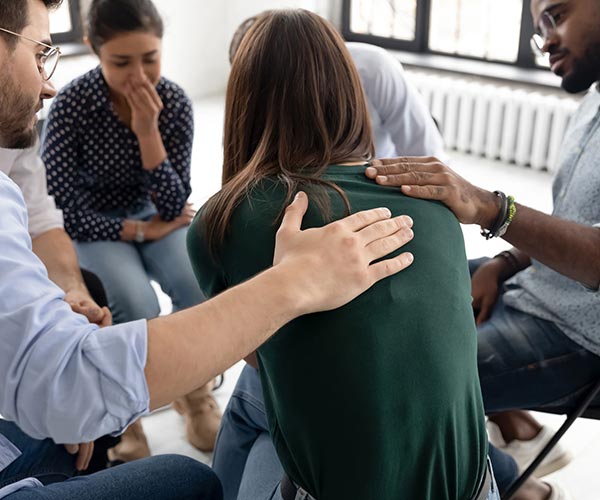Develop & Strengthen Coping Skills for Lifelong Recovery
Once addictive behaviors take hold, even minor stressors can trigger old patterns. This makes it easy to fall back into self-defeating thoughts and actions, increasing the risk of relapse.
Mindfulness strengthens your ability to observe your emotions, respond intentionally, and stay grounded during moments of stress. These coping skills support long-term recovery and relapse prevention.
At The Heights Treatment, we support you from admission through aftercare and equip you with evidence-based mindfulness tools that promote lifelong sobriety.
What Is Mindfulness?
Mindfulness is the practice of grounding yourself in the present moment. It empowers you to observe your thoughts, emotions, and physical sensations without reacting impulsively. This skill is especially helpful for individuals recovering from addiction because it interrupts destructive patterns, reduces stress, and increases emotional stability.
Mindfulness practice helps prevent automatic reactions and supports healthier decision-making.
What is Mindfulness-Based Relapse Prevention?
Mindfulness-Based Relapse Prevention (MBRP) is an evidence-based approach created for individuals recovering from substance use disorders and mental health conditions. With guidance from a trained clinician, clients learn mindfulness skills that help identify triggers, reduce stress, and remain focused on sobriety during high-risk moments.
These techniques empower clients to apply mindfulness outside of treatment, supporting long-term relapse prevention.
Learn more about preventing relapse in our guide on 6 Helpful Habits for Preventing Relapse
Or explore more recovery strategies:
10 Strategies for Substance Abuse Prevention
What are the Effects of MBRP?
Mindfulness-Based Relapse Prevention and Mindfulness-Based Stress Reduction (MBSR) help individuals stay aware of situations, emotions, or thoughts that may influence harmful or compulsive behaviors. Through consistent practice, clients build emotional resilience and strengthen healthy behavioral responses.
Many participants experience improved emotional stability, stress reduction, and confidence navigating high-risk situations. These skills continue to support recovery long after treatment ends.
Our Programming
The Heights Treatment offers personalized levels of care tailored to the unique needs of each patient. Our programs integrate evidence-based therapies, experiential modalities, and supportive community-based healing.
Programming occurs during the day to allow clients to fully commit to recovery while still maintaining responsibilities at work, school, or home in the evenings.
Learn more about levels of care:
IOP vs PHP: Understanding the Differences
Addiction Prevention vs Intervention
Individualized Intensive Program (IIP)
IIP is ideal for patients transitioning from a higher level of treatment or an inpatient program. This program offers evidence-based modalities and an integrative approach, but patients still have the flexibility to balance their recovery with responsibilities at work, home, or school.

Partial Hospitalization Program (PHP)
A PHP is an intensive level of outpatient care that’s ideal for patients transitioning from a residential treatment program or IIP. Patients still have the flexibility to tend to work, home, or school but benefit from a structured environment for treatment and care in our welcoming rehab center in Houston.

Intensive Outpatient Program (IOP)
Our IOP is a good fit for patients who have completed IIP or inpatient treatment but may need more rigorous care than an outpatient program. This program can help patients who have taken the first step toward recovery on their own and need more long-term support, treatment, and accountability.

Outpatient Program (OP)
Mental health treatment programs provide evidence-based behavioral health therapy and psychiatry. A positive community of peer support, family therapy sessions, and a compassionate staff with an individualized, strategic plan. Patients learn skills like positive awareness, coping skills, interpersonal effectiveness, and mindfulness in regular therapy sessions.

Healing From the Inside Out
We believe in holistic, whole-person healing that supports the mind, body, and spirit. All of our therapeutic modalities are backed by research and delivered in both individual and group formats to nurture a strong, supportive recovery community.
Our evidence-based therapies include:

FAQs About Mindfulness-Based Relapse Prevention
Below are answers to some of the most frequently asked questions about mindfulness-based relapse prevention for substance use disorders and mental health conditions:
Who Benefits From Mindfulness Practice?
Virtually anyone, inside or outside of substance abuse treatment, can benefit from practicing mindfulness. Mindfulness is helpful for anyone suffering from SUD, PTSD, schizophrenia, bipolar disorders, and many other conditions mentioned in the DSM-5.
Who Developed Mindfulness-Based Relapse Prevention?
Mindfulness-Based Relapse Prevention was developed originally at the University of Washington for those in recovery. MBRP is credited to Dr. Job Kabat-Zinn, with influence by the relapse-prevention work by G. Alan Marlatt.
What is Mindfulness Based Cognitive Therapy?
Mindfulness-based cognitive therapy (MBCT) is a form of psychotherapy that combines meditation exercises, mindfulness, and cognitive behavioral therapy (CBT).
Does Mindfulness Help With Dual Diagnosis Treatment?
Mindfulness meditation has shown to be exceptionally useful in the treatment of dual diagnosis. Mindfulness can help an individual stay focused on the present moment and prevent relapsing into addictive behaviors such as drug use, alcohol use, urge surfing, eating disorder behavior, and other compulsive behaviors.
How Long Does MBRP Take to Start Working?
There is no set timeline for how long it takes for Mindfulness-Based Relapse Prevention to start working, however, many people feel as if they have reached a safe “baseline” even after just beginning mindfulness training.
As with any type of therapy, it takes time and commitment to feel the full effects of mindfulness.
Can You Heal From Addiction Through Mindfulness Alone?
While mindfulness and meditation are powerful tools, clients have the best chance at recovery with a multidisciplinary treatment plan. Mindfulness-Based Relapse Prevention works best when a combination of psychotherapy and adjunct therapies such as Equine Therapy, Art Therapy, Trauma-Informed Yoga, and other holistic modalities are implemented.
The mind is a powerful thing. Mindfulness helps bring awareness to how we feel in the present moment, understand our thoughts and feelings, accept them for what they are, and make better, healthier decisions.
Will My Health Insurance Cover Addiction Treatment & Mental Healthcare?
Most major insurance providers cover admission into a treatment program and any related psychiatry, therapy programs, and follow-up appointments. During your admissions process, we will confirm your benefits with your provider.
Is MBRP Group Therapy or Individual Therapy?
Mindfulness-Based Relapse Prevention may be used in both group and one-on-one settings, and both are effective. Learning these skills individually helps you develop and strengthen your emotional and mental fortitude, and MBRP group sessions can help you put them into practice in a safe, controlled environment.
Does Mindfulness-Based Relapse Prevention Work for Processing Disorders?
Mindfulness-based relapse prevention has shown to be an effective treatment for those suffering from addiction, whether it is a processing addiction such a gambling addiction, or substance use disorders such as opiate addiction.
Healing from Addiction and Mental Health Disorders Through Mindfulness-Based Relapse Prevention
If you or a loved one is struggling with addiction, mental health symptoms, or dual diagnosis challenges, we are here to help you reclaim your life.
Speak with our admissions team today to learn more about our programs and private-pay pricing options.


